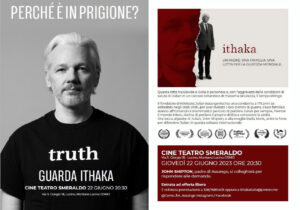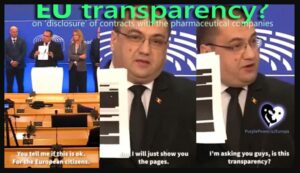Quick artificial (sorry) translation of the 25/04/2023 France Soir article on the EUrsula von der Leyen affaire.
JUSTICE – After a criminal complaint filed in Belgium against the President of the European Commission, the so-called SMS affair takes a new turn. The judge in charge of the investigation will now have to have access to the messages exchanged in secret between Ursula von der Leyen and Albert Bourla, the CEO of Pfizer. Because of the suspicion of “out-of-frame” negotiation of a mega-contract for the purchase of vaccines, not handing over these SMS messages, considered as administrative documents, would constitute a criminal offence. In the case of their destruction, President von der Leyen, as a representative of public authority, will have to explain herself before the courts. The rebound of this affair, which could reveal the existence of “a pact of corruption”, according to the French lawyer Diane Protat, is not mentioned at all in the French press, with the rare exceptions of France-Soir and l’Humanité. But what happened to the duty to inform?
 Much has been written about the vaccine contracts negotiated by SMS between Ursula von der Leyen, President of the European Commission, and Albert Bourla, President of the pharmaceutical giant Pfizer.
Much has been written about the vaccine contracts negotiated by SMS between Ursula von der Leyen, President of the European Commission, and Albert Bourla, President of the pharmaceutical giant Pfizer.
Several articles have been concerned with detailing the administrative meanderings of the case, when MEPs have twice unsuccessfully invited Pfizer’s CEO to come and explain himself to the European Parliament.
Conflicts of interest? Corruption?
Since October 2022, an investigation is underway within the European authorities. Subsequently, in December, the BonSens association initiated a procedure before the New York State Court in order to obtain the publication of the famous SMS messages, which raise serious suspicions of conflicts of interest, or even corruption, against the President of the European Commission.
Indeed, no official document relates exactly the official conditions of the negotiation of the gigantic third contract for the purchase of Pfizer vaccines, involving 1.8 billion doses, for an amount of over 70 billion euros.
While this move was not widely reported in the press, on January 25, 2023, the New York Times (NYT) in turn sued the European Commission for a similar purpose.
On April 5, 2023, the lobbyist Frédéric Baldan filed a new complaint, this time in Belgium, before the investigating judge Frenay in Liège. His complaint directly concerns the issue of the third vaccine purchase contract and the fact that it was clearly negotiated outside the usual framework for negotiating this type of contract, bypassing a steering committee responsible for evaluating the offers. Ursula von der Leyen does not have a mandate that authorizes her to intervene in this type of contract.
Belgian law has a special feature. A public official who arbitrarily infringes a right guaranteed by the constitution risks imprisonment (article 151 of the criminal code). In this case, the right to allow any citizen access to administrative documents.
A complaint with automatic civil party constitution (unlike in France, the decision of a seizure of the prosecutor’s office by the judge is not to be awaited) is therefore registered for usurpation of functions, usurpation of title, destruction of public documents, illegal taking of interests and corruption.
This case is a real earthquake on the European political scene, already impacted by suspicions of corruption against the European Commissioner for Health, Stella Kyriakidou and the QatarGate scandal.
Wastefulness
While the European authorities have not wanted to allow citizens to shed light on the costly purchase conditions of vaccines, a judicial solution may have been found at the level of a State and its jurisdiction, in this case Belgium.
In addition, a dozen European states, including Poland and Bulgaria, are now questioning the purchase price of doses and are concerned about the obligation to recommend products that, beyond their real effectiveness or not, are no longer useful when the Covid-19 epidemic phenomenon is over.
In France, 46 million doses remain on the hands of the health administration and will be wasted. In Italy, more than 30 million doses and in Belgium more than 10 million. A real waste. How can we support – or have supported – the idea of having to buy additional doses under penalty of being sued for breach of a commercial contract… that no one can consult? Or, worse, a secret agreement made in the course of sending a text message?
This situation, all to the advantage of the pharmaceutical industry, and mainly Pfizer, which has raided more than three quarters of the sales contracts, makes the European deputy Europe Ecologie-Les Verts (EELV) Michèle Rivasi say:
“It seems that it is the pharmaceutical laboratories that have held the pen at the level of the European Commission”.
The deputy was able to express herself and to detail the affair with our colleagues of l’Humanité, who have been investigating on their YouTube channel for several weeks. Valeurs actuelles has addressed the subject, in a column by Patricia de Sagazan. The European news site Euractiv has covered the information. Sud-Radio covered the news with André Bercoff, and gave the floor to Maître Protat and Frédéric Baldan.
And that’s about it, with the exception of France-Soir, of course, which has been following this legal drama since the beginning.
A disastrous silence for democracy
A soap opera that could become a major judicial and political scandal. Indeed, the President of the European Commission, who already has a troubled past with the German justice system when she was Minister of Defense, has shown many disturbing signs of friendship towards Albert Bourla.
The nature of the text messages exchanged must be exposed to the public so as not to further discredit the European institutions, short-circuited by the sole will of von der Leyen to unilaterally deal with this case. The European institutions clearly suffer from a worrying structural weakness: they are too exposed to the power of industrial and financial lobbies.
Since the beginning of the health crisis in 2020, the French media have shown a disarming inactivity on these issues. The deontology related to the Munich Charter, which must guarantee to the citizens an objective and factual information about the dangers which threaten the public thing and the common interest, is forgotten.
This silence is serious for democracy and the stability of the political sphere in Europe. While citizens’ distrust of the media is constantly increasing in France, this unfortunate situation is also damaging to the image of France, which is not reacting to the failures of the supranational institutions that now govern it to a large extent.
Also see:





